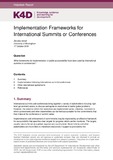| dc.contributor.author | Ismail, Zenobia | |
| dc.date.accessioned | 2019-01-07T13:27:17Z | |
| dc.date.available | 2019-01-07T13:27:17Z | |
| dc.date.issued | 2018-10-17 | |
| dc.identifier.citation | Ismail, Z. (2018). Implementation Frameworks for International Summits or Conferences. K4D Helpdesk Report. Birmingham, UK: University of Birmingham | en |
| dc.identifier.uri | https://opendocs.ids.ac.uk/opendocs/handle/20.500.12413/14233 | |
| dc.description.abstract | This rapid literature review examined the accountability mechanisms used by seven global summits or conferences: the United Nations Conference for Sustainable Development (2012), the World Health Organisation Ministerial Conference on Ending TB (2017), the Nuclear Security Summit (2016), World Conference on Indigenous People (2014), One Planet Summit (2017), the Montréal Protocol (1997), and the United Nations Conference on Trade and Development (2015). In addition, two other global agreements were reviewed: Sustainable Energy for All (2011) and the Tokyo Mutual Accountability Framework. There is no grey literature on this topic and the only articles in the academic, peer reviewed literature relate to examining the effectiveness of the Montréal Protocol. Therefore, the review relied on an assessment of the processes or frameworks for reporting and monitoring which are described in the conference or summit documents. Some of the documents were not up to date. Moreover, it was not clear whether the accountability framework was put in place at the start of the conference or summit or if it was adopted later. The review of the accountability frameworks used in the aforementioned conferences, summits or global agreements ascertained the following findings. First, while an organisational structure is necessary for implementing the resolutions or commitments, financial support is also necessary to incentivise implementation especially for developing countries. Second, measurable targets must be set at global, regional and country level. Targets and reporting can be disaggregated to reveal discrepancies according to age or sex, e.g., such disaggregation is required for monitoring progress towards eliminating tuberculosis. Third, countries report their progress by providing a country report. Reporting progress and monitoring are best facilitated if there are other agreements, conventions or protocols that facilitate such reporting. Monitoring and reporting tends to be more robust when there is a designated organisational body that manages the resolution. Finally, the documentation relating to the Nuclear Security Summit and the One Planet Summit is not explicit with regard to which entity is responsible for monitoring implementation and progress. | en |
| dc.language.iso | en | en |
| dc.publisher | IDS | en |
| dc.relation.ispartofseries | K4D Helpdesk Report;480 | |
| dc.rights.uri | https://www.nationalarchives.gov.uk/doc/open-government-licence/version/3/ | en |
| dc.subject | Development Policy | en |
| dc.subject | Economic Development | en |
| dc.subject | Millennium Development Goals | en |
| dc.subject | Participation | en |
| dc.subject | Trade | en |
| dc.title | Implementation Frameworks for International Summits or Conferences | en |
| dc.type | Other | en |
| dc.rights.holder | © DFID - Crown copyright 2018. | en |
| dcterms.dateAccepted | 2018-10-17 | |
| rioxxterms.funder | Department for International Development, UK Government | en |
| rioxxterms.identifier.project | K4D | en |
| rioxxterms.version | VoR | en |
| rioxxterms.funder.project | 238a9fa4-fe4a-4380-996b-995f33607ba0 | en |

